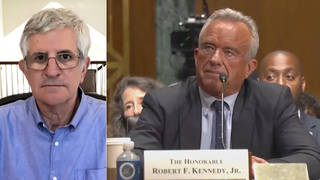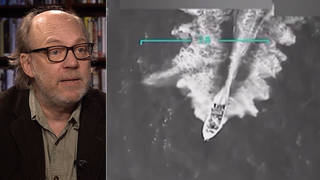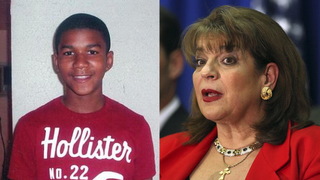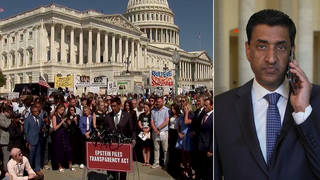
Topics
Guests
- Michael Skolnikeditor-in-chief of GlobalGrind.com. He is also on the board of directors of the Trayvon Martin Foundation.
We look at the tragic case of a Florida high school student named Jordan Davis who was shot dead in 2012 on the day after Thanksgiving over a dispute about loud music. The trial of his killer, Michael Dunn, began Thursday. Dunn claims he felt threatened by Davis and his three teenage friends in an SUV that pulled up next to him. According to his police interview, one of the teens in the car said something about “killing.” Dunn said when Davis allegedly bent down in the car, he feared he was reaching for a weapon. Dunn then used his handgun to shoot four times into the SUV. When the teenagers started to retreat, Dunn chased their vehicle and shot four to five more shots. Jordan was fatally shot in the back seat. Dunn is expected to use the Stand Your Ground defense during his trial, in which he faces the same prosecutor who argued the Trayvon Martin case. We play excerpts from the trial’s opening arguments and speak with Michael Skolnik, editor-in-chief of GlobalGrind.com, who has been closely following the case and has been in contact with Davis’ parents. He serves on the board of directors of the Trayvon Martin Foundation. Skolnik also explains why he’s asked the rapper DMX not to fight George Zimmerman in a celebrity boxing match.
Transcript
JUAN GONZÁLEZ: We turn now to the tragic case of a Florida high school student named Jordan Davis, who was shot dead in 2012 on the day after Thanksgiving.
LUCIA McBATH: I appear here before you because my son Jordan was shot and killed last November while sitting in the back seat of a friend’s car listening to loud music. The man who killed him opened fire on four unarmed teenagers, even as they tried to move out of harm’s way. That man was empowered by the “Stand Your Ground” statute. I am here to tell you there was no ground to stand. There was no threat. No one was trying to invade his home, his vehicle, nor threatened him or his family.
There was a vociferous argument about music, during which the accused, Michael Dunn, did not feel that he was treated with respect. “You’re not going to talk to me like that!” he shouted, as he sprayed the car that Jordan sat in with bullets, killing him instantly. When Jordan’s friends tried to backed the car away, Mr. Dunn aimed his handgun and fired off several more rounds. Nine total pierced the car.
JUAN GONZÁLEZ: Those were the words of Lucia McBath, the mother of 17-year-old Jordan Davis, testifying before the Senate in October.
Well, on Thursday, the trial began for Michael Dunn, the man who admits he repeatedly shot Jordan after an argument over loud music. The case has been compared by some to that of Trayvon Martin.
AMY GOODMAN: Like Trayvon, Jordan Davis was a black teenager shot dead in Florida by an older gunman claiming self-defense. During opening arguments Thursday, Assistant State Attorney John Guy said Davis was unarmed and never left his car.
JOHN GUY: And you’ll see, through the photographs, that when the bullets went through Jordan Davis’s closed door, it blew pieces of the inside of the door into the car, big pieces of plastic and rubber into the car, because the door was closed. And they searched the car. There was a basketball in the back. There were basketball shoes. There were clothes. There were the big, 12-inch speakers. There were cups on the floor. There were no weapons, no guns, no bats, no tire irons. There was a camera tripod stuffed under one of the seats. No weapons.
JUAN GONZÁLEZ: Prosecutor John Guy went on to detail how the shooter, Michael Dunn, left the scene of the shooting, drove 40 miles to a hotel with his girlfriend. They ordered a pizza and watched a movie. The next day, they drove to their home 130 miles away. He never called the police. Michael Dunn’s defense attorney, Cory Strolla, argued in court that Dunn’s actions were justified.
CORY STROLLA: Jordan Davis threatened Michael Dunn. “You’re dead, bitch! This is going down now!” With a shotgun barrel sticking out of the window, or a lead pipe—whatever it was, it’s a deadly weapon. And you’ll hear the law from Judge Healey, and you’ll rule on that law. And you’ll see the evidence. They can try to show you the forensics, but what they can’t do is match the trajectory of Jordan Davis getting out of the car. And it wasn’t, as Mr. Guy said, Mr. Davis was leaning over. You know why? You know why we know that’s not true? And you’ll find out, because Leland Brunson will testimony that as they saw Mr. Dunn reach for the gun, everybody in the vehicle ducked. Tommie Stornes ducked. Tevin Thompson ducked. Leland Brunson ducked. Know who didn’t duck? Jordan Davis. You know why he didn’t duck? Because he was getting out of athecar with a weapon, after telling Michael Dunn, “You’re dead, bitch! This is going down now!” You have four men against one. But you know what Jordan Davis didn’t realize? The other man was armed. And there’s an expression: God all made men equal—or, God didn’t make all men equal; Colt did. And Colt is a firearm. And that’s what happened. And it’s tragic. We’re not here to change the law. We’re not here to say anybody deserved to lose their life. But under the law, it’s justified.
AMY GOODMAN: Cory Strolla, the attorney for Michael Dunn, the man on trial in Florida for shooting dead 17-year-old Jordan Davis after an argument about loud music. Again, none of the four young men got out of the car. Jordan Davis was killed in the car.
To talk more about the trial, we’re joined by Michael Skolnik, editor-in-chief of GlobalGrind.com. He’s been closely following the case, has been in contact with Jordan Davis’s parents, serves on the board of directors of the Trayvon Martin Foundation. Talk about the significance of this case. We’re talking Stand Your Ground again?
MICHAEL SKOLNIK: Yeah, I think, Amy, the significance of this case certainly has been heightened since the acquittal of George Zimmerman, when we watched a guy walk for killing an unarmed teenager. And now, once again, we see this play over again. We see the same sort of episode: A white older gentleman “threatened,” quote-unquote, by black teenagers in a car, and says that—you know, “Turn your music down.” They respond to him—
AMY GOODMAN: But he went over to them.
MICHAEL SKOLNIK: He was in his car. He opens his window.
AMY GOODMAN: They’re at a gas station.
MICHAEL SKOLNIK: They’re at a gas station. They’re sitting next to each other in the parking lot. His girlfriend goes into the store to buy some wine and a bag of chips. He tells them to turn the music down. The kids say no. He says, “Don’t talk to me like that.” And he shoots them. Not only does he shoot them; he shoots them, and then he shoots them again as they’re driving away to get away from the gunshots, and he shoots them four more times, which are the two bullets that killed Jordan Davis.
AMY GOODMAN: He was in the back seat, passenger side.
MICHAEL SKOLNIK: He was in the back seat of the passenger side, yes.
JUAN GONZÁLEZ: And this whole issue of him then just driving away and not even reporting the incident, not even reporting that he was allegedly or he claims to have been threatened by them, or calling the police.
MICHAEL SKOLNIK: You know, Juan, the hard thing for me to rationalize here is that, as I was reflecting last night, the defense attorney was trying to make sense of why he would drive away, why he would go to a motel, why he would order food, why he would sit and watch a movie, why he would make himself a rum and coke, why he would walk his dog, why he would drive two-and-a-half hours to his house the next day, and never call the police. And the defense said it was because of his girlfriend. She was the one who made him do this. They basically threw her under the entire bus and said it wasn’t him. He was panicked. He was flipped out. And she was the one who said, “Let’s go back to the hotel.” That, to me, is hard to sit with. This gentleman—and let’s remember the difference between this case and the Trayvon Martin case. This gentleman, Michael Dunn, has been in prison, in jail, since he was arrested. He has not been bonded out since he was arrested, because the court has felt he was a threat to society.
AMY GOODMAN: You were tweeting out all day yesterday, following the opening arguments online. What most struck you in the arguments on both sides?
MICHAEL SKOLNIK: Well, I think, you know, John Guy, who is the prosecutor, you know, state prosecutor here, the assistant prosecutor in the case, who gave the opening argument for the state, was also the same prosecutor who gave the opening argument for the Trayvon Martin—for the George Zimmerman trial. I think the important thing to watch here is, one of the big mistakes that was made during the George Zimmerman trial was they played George Zimmerman’s statements and video. They played his re-enactment video, if you will, to the jury. I think that John Guy will try, and Angela Corey, as well, the state prosecutor—
AMY GOODMAN: So, Angela Corey, the same prosecutor—
MICHAEL SKOLNIK: Yes.
AMY GOODMAN: —who oversaw the case of—
MICHAEL SKOLNIK: Of George Zimmerman, who also prosecuted Marissa Alexander and put her away for 20 years. So the same person who prosecuted Ms. Alexander is prosecuting Michael Dunn. I think they will try everything they can to put Michael Dunn on the stand. I don’t think you will hear many statements being made during the state’s case about what Michael Dunn said. They will try their best to get him onto the stand.
JUAN GONZÁLEZ: But in this case, there were witnesses, unlike the Trayvon Martin case, where there are at least, what, three other youths that were in the car, as well.
MICHAEL SKOLNIK: Well, you have three folks who were in the car. Three of Jordan’s friends were in the car. Leland, who they speak about on the video here, was the one who carried Trayvon—excuse me, carried Jordan as he was dying. And then you also have witnesses at the gas station. You have two folks who were working at the gas station. You have people—a contractor, who testified yesterday, who came to the gas station. You have another homeless man, who was in his car, who watched it happen, who wrote down the license plate number and gave it to the cashier. And that’s how they found Michael Dunn, because the police went to his house looking for him in his home, and he showed up the next day.
AMY GOODMAN: And the description by one of the witnesses saying how the young men in the car, as they were all weeping, as Jordan was killed.
MICHAEL SKOLNIK: Again, to try to rationalize this, the defense attorney was saying that they didn’t show any emotion, when they—they didn’t tell anyone to call 911. They just got shot at nine times, I mean, in your car, having—at 7:00 on a Friday night.
AMY GOODMAN: Let’s turn to a clip of Michael Dunn—again, he’s the man on trial. This is not in the trial, but when he was being questioned by police. This is how Dunn describes what happened the day he killed 17-year-old Jordan Davis.
MICHAEL DUNN: There’s like a SUV next to us, and then the music starts. And I roll down my window. And I thought I was polite. I asked them nicely. I didn’t demand. I didn’t—”or else.” I said, “Hey, would you guys mind turning that down?” And they shut it off. I was like, “Thank you.” Cordial, right. Things cordial. I put my window back up. I was doing my stuff. And I don’t know how many kids are in that, but the windows are down for the back seat. The windows are up for the front seat.
POLICE OFFICER: OK.
MICHAEL DUNN: And the guy that was in the back is getting really agitated. And my window’s up. I can’t hear everything he’s saying, but, you know, there’s a lot of “[expletive] him” and “[expletive] that” and “[expletive] that [expletive].” And then the music comes back on.
And, you know, I’m just like, live and let live, and, you know, don’t need any trouble. And I don’t know if they’re singing or what, but it’s like they’re saying, “Kill him.” So I put my window down again, and I said, “Excuse me, are you talking about me?” And it was like, “Kill that [expletive]” And, you know, I’m still not reacting to them.
This guy, like, goes down on the ground and comes up with something. I thought it was a shotgun. And he goes, “You’re dead, [expletive].” And he opens his door. And I’m [expletive] bricks. But that’s when I reached in my glovebox, unholstered my pistol. [expletive] Quicker than a flash, I had a round chambered in it, and I shot.
AMY GOODMAN: That was Michael Dunn being questioned by police. Michael Skolnik, of course, the police say they found no weapon.
MICHAEL SKOLNIK: I think, you know, the hard part is, Michael Dunn wrote a letter to his grandmother from prison that was given to the state prosecutor. I don’t know if it will be introduced in court, but we do—we have seen it, where it says that there are all these thugs here in prison, and if we just killed them before they threatened us, they would change their behavior. I think the challenge here, as we move into this new America—this new America is emerging—there are these stereotypes that young black men are threatening, to some, like Michael Dunn. He might have perceived that there was a weapon. He might have thought there was a weapon. He might have hoped there was a weapon. He might have thought these kids usually carry weapons. But there was never a weapon. Yesterday in court, the defense attorney now changed it: It might have been a shotgun or a lead pipe, and they stashed it, but it’s never been found. They threw it under a car, but the police are so bad, they never found it. That’s their theory now. I don’t think it will hold up in court. They certainly will try their best to convince the jury.
AMY GOODMAN: You’ve also been involved with the George Zimmerman—is it going to be a boxing match? Explain what’s going on with this.
MICHAEL SKOLNIK: Yes. George Zimmerman was contacted by a promoter in Florida to put on a, quote-unquote, “celebrity boxing match.” I think anyone should use that term quite lightly. And they were looking for an opponent. And George said, “I’d fight anyone, even if they’re black.” TMZ, the tabloid news outlet, found DMX on the street, a rapper who we’ve loved and adored for many, many years, and said, “Would you fight George Zimmerman?” He said, “Of course I’d fight him.” And then, all of a sudden, the story came out that George Zimmerman was going to fight DMX.
I have been in contact with DMX’s publicist, and trying to get in contact with DMX himself, who’s hard to find, but urging them, “Don’t do this. Don’t bring the attention to George Zimmerman.” We don’t need—I’m going to Miami. I sit on the board of directors of the Trayvon Martin Foundation. Trayvon would have been 19 years old this Wednesday. I’m going to Miami this weekend to celebrate his life with his family in our annual peace walk and our annual dinner we have for the foundation. The family does not want this attention brought to George Zimmerman. DMX, I urge you—if anyone who knows him is listening—don’t do this.
AMY GOODMAN: We’re going to go out with the words of Lucia McBath, Jordan Davis’s mother, testifying last October during a hearing on the public safety implications of Stand Your Ground laws. She was speaking before the Senate Judiciary Committee’s Subcommittee on the Constitution, Civil Rights and Human Rights.
LUCIA McBATH: He was my only child. He was raised with love and learning and a clear understanding of right and wrong. I have been without Jordan now since Thanksgiving weekend 2012, without him last Christmas and on his birthday in February. I never got to take his prom picture or see him graduate from high school. I can tell you all about him, about his easy smile, his first girlfriend and his plans to join the Marines. I can tell you how he loved his dad’s gumbo, and how they both rooted for the New York Giants. But you can never really know my boy, because an angry man, who owned a gun, kept it close at hand and chose to demonstrate unbridled hatred one balmy evening, for reasons I will never understand. These laws empowered his prejudiced beliefs and subsequent rage over my son’s own life, his liberty and pursuit of happiness.
AMY GOODMAN: Lucia McBath. That’s the mother of Jordan Davis. The man who killed Jordan Davis, Michael Dunn, is now on trial in Florida.
This is Democracy Now! When we come back, what is “affluenza”? Stay with us.












Media Options